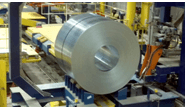Government/Policy

July 13, 2022
Corrosion-Resistant Steel Import Duties Will Not Be Sunset
Written by Laura Miller
US imports of corrosion-resistant steel products from five origins will continue to be subject to antidumping and countervailing duties for at least another five years.
The US International Trade Commission concluded five-year sunset reviews of the duties on the imports from China, India, Italy, South Korea, and Taiwan, determining that allowing the duties to expire, or sunset, would be likely to lead to the continuation or recurrence of material injury to the domestic injury.
Full sunset reviews of the duties began on June 1, 2021. Five ITC commissioners voted in the affirmative in support of maintaining the duties. The ITC’s full report containing additional information will be available in late August.
These were the first sunset reviews of these duties which have been in place since 2016. Antidumping and countervailing duties are required by international law to be reviewed every five years to determine if they should be continued or allowed to expire.
The US Department of Commerce concluded its own sunset reviews of these duties last year, determining that revoking the antidumping duties would be likely to lead to the continuation or recurrence of dumping at margin rates of 4.43% for India, 92.12% for Italy, 209.97% for China, 8.75% for Korea, and 10.34% for Taiwan. In the countervailing duty sunset reviews, Commerce found that revoking the duties would likely lead to countervailable subsidy rates of 6.12-530.74% for India, 0.07-38.51% for Italy, 39.05-241.07% for China, and 0.72-1.19% for South Korea. The ITC has the final say, however, whether the duties will be sunset or not.
By Laura Miller, Laura@SteelMarketUpdate.com







